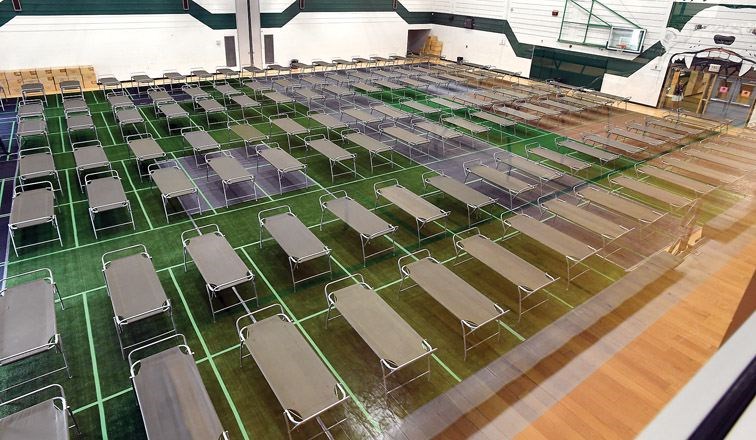Last year at this time, with smoke in the air and Cariboo evacuees streaming into Prince George, local residents stepped up.
According to Volunteer Prince George, more than 380 volunteers signed up to lend a hand on the very first day. During the height of the evacuation, five paid employees and seven volunteers coordinated the registration of 2,267 local residents, who put in more than 19,000 volunteer hours.
An amazing effort, both by Volunteer Prince George and by the community, to help in a time of desperate need.
Northern Health also made miracles happen.
According to information provided by Northern Health, patients and long-term care facility residents from throughout the Cariboo began arriving in Prince George before the formal evacuation order was given and many of those people stayed well after the order was lifted, due to air quality issues and the challenges of moving individuals with complex health problems.
In the end, more than 300 individuals requiring health care made their way from Quesnel but also from Williams Lake, 100 Mile House and First Nations communities that are actually covered by Interior Health.
Clinics were also set up at CNC and at the Northern Sport Centre at UNBC for outpatient care and pharmacy support. They saw more than 1,000 patients visits during the evacuation.
In reply to The Citizen's request for information on labour costs incurred during the wildfires crisis, Northern Health disclosed that it submitted $4.6 million in costs to the Ministry of Health, of which $3.1 million were labour costs, $805,000 was spent on patient costs, such as food, drugs, supplies and housekeeping, while an additional $432,000 went to facility costs.
Breaking down the labour expenses, Northern Health paid out $1.86 million in straight time and $1.24 million in overtime. Unionized employees were paid based on their collective agreements.
"Much of the OT was related to the challenges in filling the staffing rotations for direct care," Northern Health reported. "Executive members did not receive any additional compensation."
The health authority did not track the volunteer or unpaid hours of work its staff contributed during the evacuation.
Over at CNC, the college billed $148,000 in evacuee-related costs to the City of Prince George to pass on to Emergency Management B.C. (what used to be called the Provincial Emergency Program).
The biggest cost for CNC was in overtime for unionized workers, which cost more than $62,000, along with another $16,000 in "wages over and above regular wages," according to information provided by CNC to The Citizen.
The college spent more than $47,000 in materials and supplies, as well more than $15,000 to repair building damage.
CNC also billed Northern Health nearly $11,000 in costs, with the biggest charges for providing a casual health and wellness administrative assistant, who was paid about $30 an hour for 123.5 hours, totalling $3,700 and moving hospital beds at the beginning and end of the evacuation ($3,500).
Like Northern Health, CNC and UNBC did not pay overtime to senior staff but did grant overtime to unionized employees, as per their contracts. UNBC billed the City of Prince George, to pass on to Emergency Management B.C., $315,000, of which $278,000 went to goods, equipment, materials and revenue loss at the Northern Sport Centre, with the remaining $37,000 going towards staff overtime.
Unlike Northern Health and CNC, UNBC broke down the overtime costs down to the employee level as part of the Citizen's request, showing that 40 UNBC staff members were paid overtime during the evacuation, ranging from $29.08 for 1.25 hours worked at straight time to one individual who was paid $8,372.58 for 148 hours worked, almost all of it at time-and-a-half, which for this individual worked out to about $56 per hour.
The second highest overtime payout was for $3,130.61 for 49 hours at time-and-a-half, which adds up to $63.89 per hour.
The information provided by UNBC stressed that the university did not charge for the regular time of "numerous" employees who provided assistance to the evacuation effort as part of their daily duties, "a decision made by the UNBC Executive to recognize UNBC's contribution towards this unprecedented emergency."
Thousands of volunteers and employees working tens of thousands of hours, some paid and some not, came together to take care of our evacuated southern neighbours in their time of need.
That's an incredible accomplishment that should never be forgotten.
-- Editor-in-chief Neil Godbout



